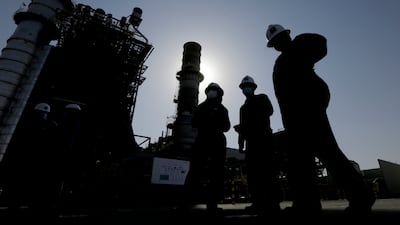Oil prices soared on Monday after Opec+ producers pledged to collectively cut output by 1.16 million barrels of crude per day on Sunday.
Both Brent, the benchmark for two thirds of the world’s oil, and West Texas Intermediate, the gauge that tracks US crude, jumped more than 6 per cent in early trading and continued to trade strong.
Brent was 5.95 per cent higher trading at $84.65 a barrel at 8.53pm UAE time, while WTI was up 6.18 per cent at $80.35 a barrel.
The group of 23 oil-producing countries, which slashed its collective output by two million barrels per day last year, was expected to stick to the agreed production levels at its meeting on Monday.
But prices plunged to a more than one-year low last month due to a banking crisis in the US that had spread to Switzerland, leading to the collapse of four lenders and triggering a broad sell-off in financial markets.
The jump in prices on Monday comes after Opec+ members Saudi Arabia, the UAE, Iraq, Kuwait, Oman and Algeria made a surprise announcement on Sunday that they would implement voluntary oil production cuts from May until the end of the year as a precautionary measure aimed at supporting the stability of the oil market.
Saudi Arabia, the world’s biggest oil exporter and Opec's largest producer, said it would cut its output by 500,000 bpd from May until the end of the year as a “precautionary measure”.
The UAE will cut its output by 144,000 bpd for the same period, “to ensure market balance and comes in alignment” with Opec+ members, UAE Minister of Energy and Infrastructure Suhail Al Mazrouei said.
Iraq's oil ministry also announced an output cut of 211,000 bpd from the beginning of May until the end of the year as a “precautionary measure to face the challenges facing the global oil market, to strike a balance between supply and demand and market stability”.
Kuwait will cut oil production by 128,000 bpd and Algeria will implement a “voluntary” cut of 48,000 bpd, starting next May and until the end of the current year, in co-ordination with Opec+ producers, the Ministry of Energy and Mines said on Sunday.
Kazakhstan will voluntarily cut its oil output by 78,000 bpd day from May until the end of the year in co-ordination with other Opec+ members, its Ministry of Energy said.
Oman will reduce crude oil production by 40,000 bpd, Gabon would make a voluntary cut of 8,000 bpd, while Russia said the 500,000 bpd cut it was implementing from March to June would continue until the end of the year.
This takes the output cut to over 1.66 million bpd by the end of this year in addition to the 2 million bpd production cut implemented at the end of last year.
"Our oil market balance projections for this year had assumed a deficit would develop in the second half of 2023 with Opec+ holding its prior output targets steady," said Daniel Richards, an economist at Emirates NBD.
"That deficit is now set to widen and further supports our belief that oil prices will shake off the recent losses sparked by the strain in financial markets and will gain over the remainder of the year."

Goldman Sachs recently reduced its oil price forecasts for 2023, citing growing crude supplies and lower demand. The investment bank now expects Brent to trade at $95 a barrel by the end of this year from a previous $90 estimate and $100 in 2024 compared with a prior $97 forecast.
"Opec+ has very significant pricing power relative to the past given its elevated market share, inelastic non-Opec supply, and inelastic demand," the investment bank's analysts wrote in a research note.
The group's surprise cut is "consistent with the new Opec+ doctrine to act pre-emptively because they can without significant losses in market share", they said.
"Once again, Opec+ implements a precautionary production cut like in October 2022. However, unlike then, the momentum for global oil demand is up not down with a strong China recovery, the Brent forward curve is backwardated, and refining margins remain resilient."
Ha Nguyen, executive director for global oil at S&P Global Commodity Insights, said oil prices are set to increase "in large part to a rise in jet fuel demand within China and higher gasoline demand in the Western portion of the world … rising demand in the second half of 2023 will tighten the supply-demand balances”.
The International Energy Agency expects global oil demand to rise “sharply” this year on the back of pent-up Chinese demand and a rebound in air traffic.
China is the world's second-largest economy and the biggest importer of crude.
Goldman Sachs estimates the reopening of China’s economy and a full recovery in the country's domestic demand will be a boon to the global economy, boosting world gross domestic product by about one per cent in 2023 and lead to a rally in oil prices.


